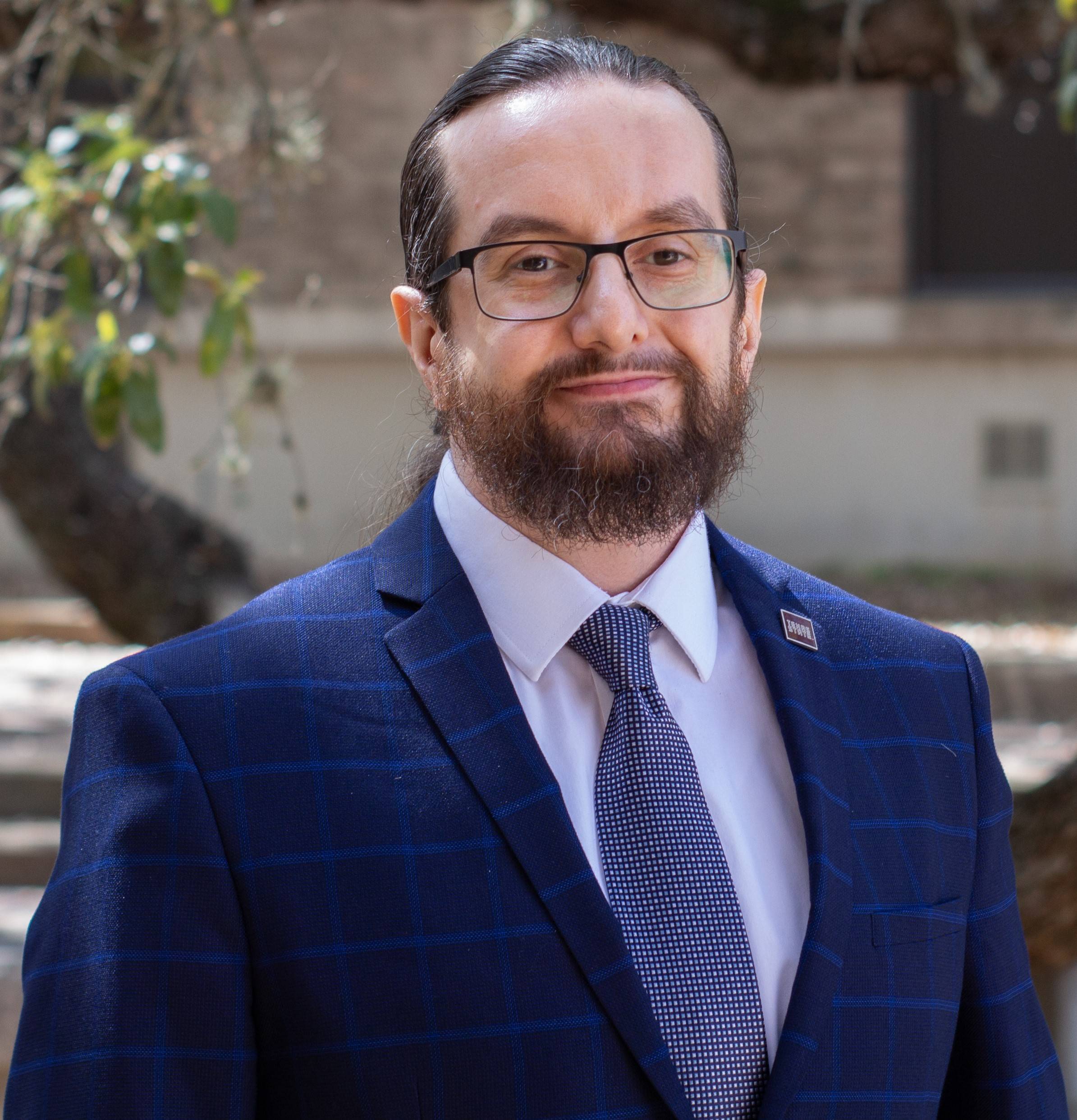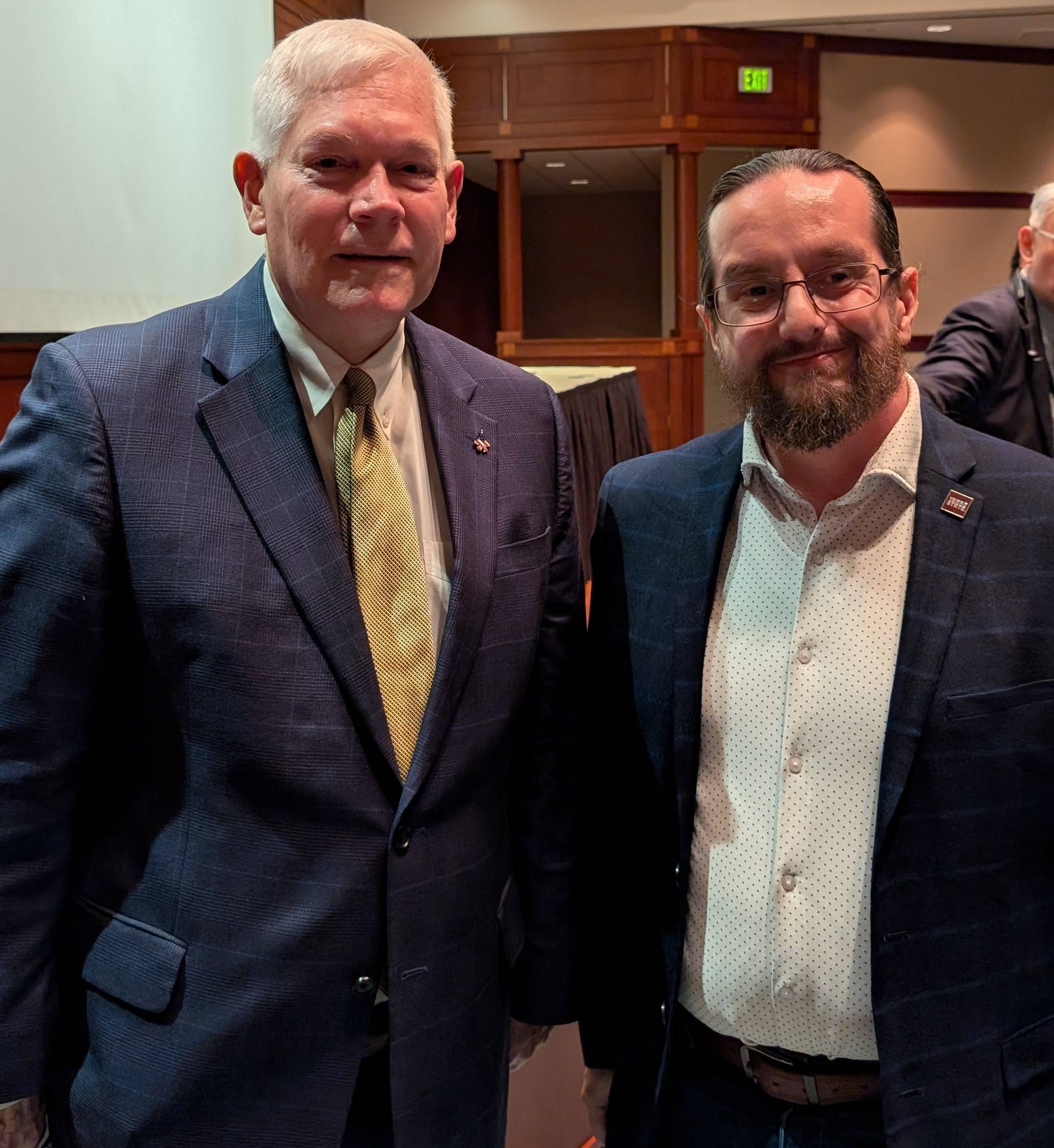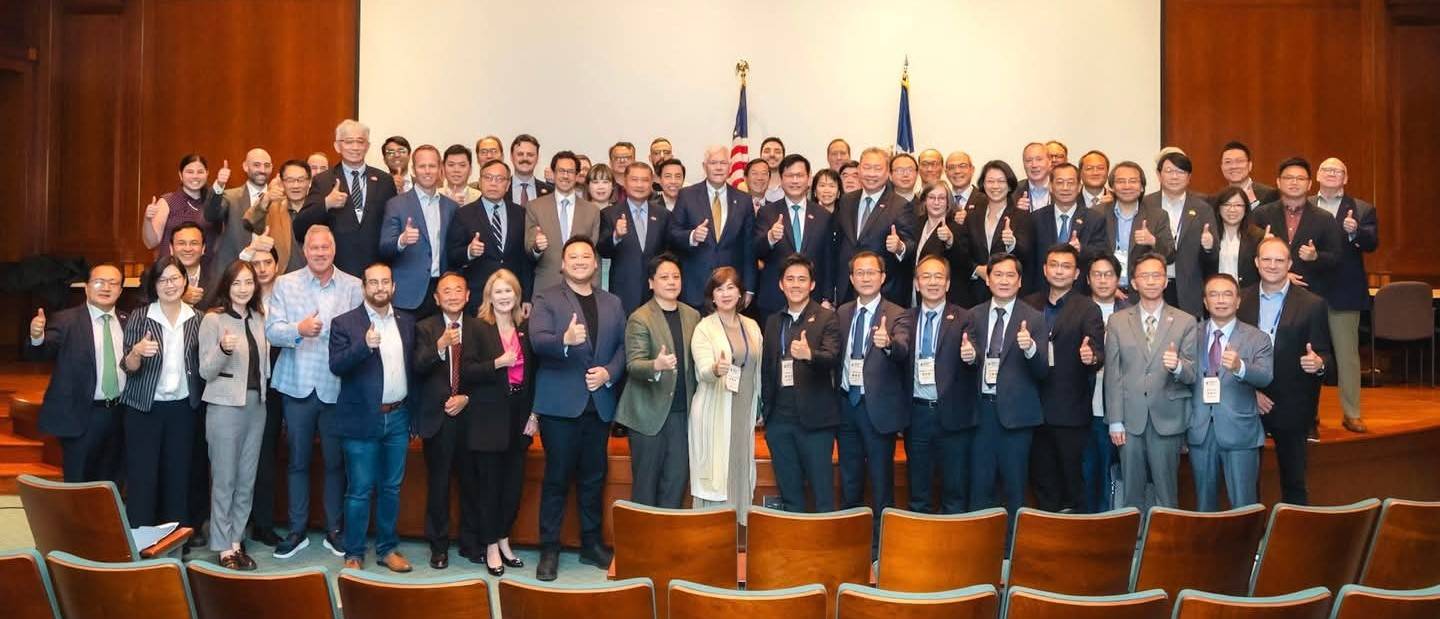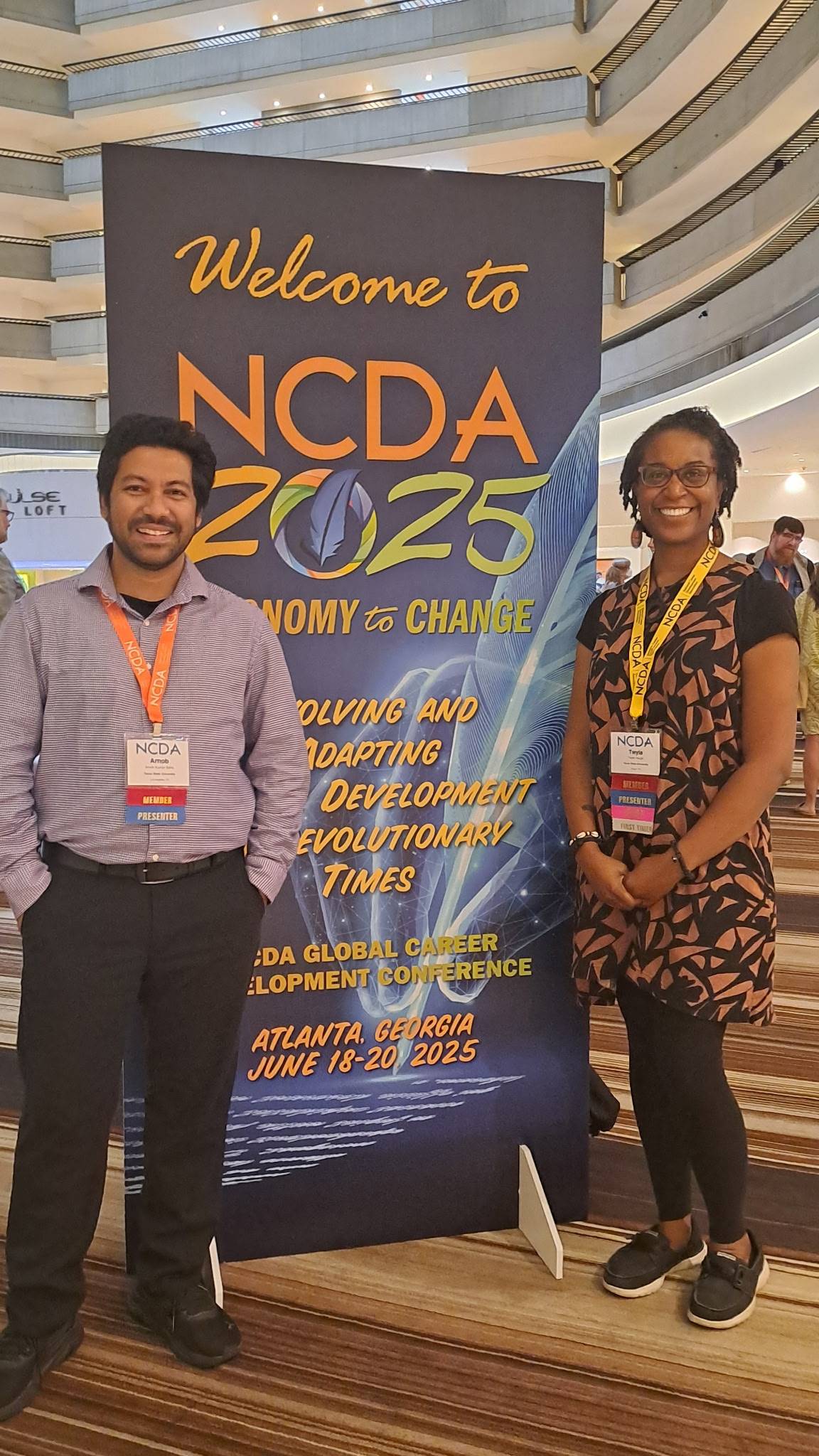Summer 2025

Dr. Jennifer Vasquez, Assistant Professor in the School of Social Work, presented How Viniyoga Supports Health and Healing at the International Congress of Qualitative Inquiry on May 14th. Later that month, her manuscript, The Effects of a Recovery High School Program on Recovering Adolescents' Resilience—co-authored with Dr. April C. Bowie-Viverette and Dr. Rebecca J. Gomez—was accepted for publication in Children and Schools on May 30th.
She recently completed the Center for Health Equity Research (CHER) Institute Scholars Program, a competitive mentorship initiative that provided an additional year of guidance in developing an NIH grant following her CHER Fellowship in summer 2024. In mid-June, she received acceptance for her article, Compassion fatigue and compassion satisfaction among NeuroAffective Relational Model Therapists: How NARM serves as a protective factor for trauma therapists, in the Social Work and Social Sciences Review.
In late June, Dr. Vasquez submitted her first NIH project, A Study of the Experiences and Effects of Yoga Therapy Interventions on Recovery High School Youth Depression, Anxiety, Stress, Commitment to Sobriety, and Mindful Self-Care. She was also elected to the Board of Directors of the National Association of Social Workers, Texas Chapter, with her three-year term beginning July 1st. On July 3rd, her research team published an article, Exploring the Practice of One-to-One Therapeutic Viniyoga: A Qualitative Investigation Using Interpretative Phenomenological Analysis and Directed Content Analysis in OBM Integrative and Complementary Medicine.

Dr. Felix Quayson, Assistant Professor of Practice in the Department of Organization, Workforce, and Leadership Studies, received the Presidential Distinction Award for Excellence in Service in June 2025. That same month, he was awarded a U.S. Fulbright Specialist designation, earning a three-year roster tenure.
The Fulbright Specialist Program, sponsored by the U.S. Department of State with funding from the U.S. Government and administered by World Learning, pairs highly qualified U.S. academics and professionals with host institutions abroad. Through this program, Dr. Quayson will be eligible to match with projects—ranging from two to six weeks—designed by host institutions in more than 150 countries.
He extends special thanks to his research mentors from the United States and Brazil for their recommendations and support.

The Outdoor Research Collaborative (ORC) is dedicated to cultivating a compassionate and inclusive community that advances outdoor health practices and research through ethical, transparent, and collaborative approaches. Central to its mission is amplifying participant voices and championing social and environmental justice. Dr. Norton’s engagement with the Collaborative not only shapes her research but also enriches her teaching—particularly her graduate elective in Adventure Therapy, where these values come to life in practice.
Dr. Christine Norton, Professor in the School of Social Work, has been awarded a $43,000 subaward through the University of New Hampshire, funded by the Peterffy Foundation.
This award supports her ongoing research in outdoor therapy and her work to strengthen researcher-practitioner partnerships through the newly launched Outdoor Research Collaborative (ORC) for Health, Wellbeing, and Experiential Engagement, where she serves as Co-Coordinator, with Dr. Anita Tucker at UNH.


Dr. Lidia Nuno, Associate Professor in the School of Criminal Justice and Criminology, was lead author on two recently published scholarly articles. In the Hispanic Journal of Behavioral Sciences, her study, Immigration Status and Crime: A Comparison between Hispanic Undocumented Immigrants and U.S. Citizens, used self-reported data from 1,948 arrestees in a large county jail to examine the relationship between immigration status and criminal behavior. Findings revealed that undocumented immigrants were significantly less likely than U.S. citizens to engage in property crime, violent crime, or drug use, with no significant difference in drug sales—challenging the perception that undocumented immigration drives crime.
She co-authored, with Dr. Edward R. Maguire, Dr. Andrew M. Fox, and Dr. Charles M. Katz, Differences in Ego Networks Between MS-13 Gang Members in Los Angeles and San Salvador: Assessing the Gang’s Transnational Capacity, a study comparing the social networks and criminal activities of MS-13 members in both cities. The findings revealed that while MS-13 members’ networks in both locations were primarily local, those in Los Angeles were far less involved in criminal activity than their counterparts in San Salvador—indicating a more limited transnational criminal capacity than is often portrayed

The study examines how cognitive biases—particularly confusion between group- and individual-level probabilities—can distort suspect prioritization, misdirect law enforcement inquiries, and contribute to investigative failures, wrongful convictions, and unsolved cases. Drawing on historical examples and probability theory, the authors highlight how this bias can affect areas such as terrorist identification, forensic testing, and criminal profiling. Their findings suggest that improved numeracy, careful framing of probability-related questions, and basic awareness training for police detectives could help mitigate these errors, ultimately leading to more accurate and efficient investigations.
Dr. Kim Rossmo, Professor, and Dr. Angela Jones, Associate Professor, in the School of Criminal Justice and Criminology, recently published an article in the Journal of Criminal Justice titled Group-individual probability confusion: Implications for suspect prioritization in criminal investigations.

In The Unending Disappearance of Jason Landry, an article by Peter Holley for Texas Monthly, Dr. Kim Rossmo—renowned criminologist and director of the Center for Geospatial Intelligence and Investigation at Texas State University—shared how he applied his expertise in geographic profiling to aid the search for Jason Landry, a Texas State University student. At the request of the Caldwell County Sheriff’s Office and Texas Search and Rescue, Rossmo conducted a Bayesian analysis of the incident’s geography, visiting the crash site on Salt Flat Road both day and night to better understand the conditions Jason may have encountered. He developed a geographic profile outlining the most probable locations where searchers should search for Jason’s body. While foul play was theorized by some, Rossmo ultimately concluded that Jason most likely died from hypothermia following the crash—a theory that helped shape subsequent search strategies and law enforcement’s working approach.

Dr. Nadim Adi, Assistant Professor in the School of Family and Consumer Sciences, participated in the Texas–Taiwan AI & Innovation Summit in Austin, where he met with Congressman Pete Sessions and Taiwan’s Minister of Foreign Affairs, Lin Chia-lung. The summit focused on strengthening global collaboration in AI, innovation, and education.


At Texas State University, Dr. Adi is developing the university’s first AI module tailored specifically for interior design. Part of the broader AI Module Working Group initiative, this resource will be available to faculty at the start of the upcoming semester.
Dr. Adi co-authored with Dr. Asha Hegde and Dr. Intisar Ameen Tyne an article in Journal of Building and Environment titled Visual and non-visual classrooms lighting in a large university – A case study. He has also launched a new mental health and design video series, created in collaboration with the School of Journalism and Mass Communication, which examines the emotional and cognitive impact of the built environment. The project was well received, generating promising engagement from both academic and public audiences.

Dr. Lesli Biediger-Friedman, Associate Professor in the School of Family and Consumer Sciences, and Dr. Shadi Maleki, Lecturer in the Department of Geography and Environmental Studies, presented at the 2025 Aging in Texas Conference in Waco on June 26th, 2025.
Their session, NUEVA: Nutrition for Underserved Elders Via Application Development and the Older Adult Socioeconomic Disadvantage Index (OASDI), introduced publicly available program resources for NUEVA and reviewed the novel OASDI tool. The presentation highlighted assessments of potentially at-risk older adult populations in Central Texas.
NUEVA is a digital health intervention that leverages mobile technology to deliver food, reduce loneliness, and support the health of older adults in the region. The project uses community-engaged, mixed-methods approaches to design, implement, and evaluate a multi-functional, multi-platform app for senior nutrition programs. THRC is proud to support research that improves well-being among aging populations.

Dr. Gwendolyn Hustvedt, Professor in the School of Family and Consumer Sciences, released Groundwork: Art Honoring the Aquifers, a catalog associated with her current solo exhibition at the River of Life Gallery in the Guadalupe Regional Medical Center in Seguin. In this work, textile artist and educator Hustvedt presents fifteen five-foot silk banners that illuminate the unseen foundations of life, the underground water systems, root networks, and the layers of meaning woven through geology, ecology, and myth.
Using the Serti silk painting method, she channels the movement of dye much like the flow of water through limestone, revealing vibrant scenes inspired by the Edwards Aquifer, the San Marcos River, and archetypal landscapes rooted in collective memory. Each banner is paired with a reflective essay, offering insight into the ecological, symbolic, and emotional dimensions beneath the surface.
Groundwork brings together Hustvedt’s lifelong work at the intersection of sustainability, material culture, and symbolic storytelling.
The exhibition reflects:
- Environmentally conscious surface design using rice-based resists
- Liminal imagery drawn from geological and psychological depth
- Reflections on ecological stewardship, personal memory, and ancestral wisdom
This exhibition invites viewers on a contemplative journey across time, through sediment, and into the interior landscapes of both place and psyche. The accompanying catalog with 15 essays and 38 pages of full-color photos is available in softcover, hardcover, and eBook format and may be purchased at the Pecantown Books and Brew bookstore in Seguin, on Amazon, Apple Books and directly from Gwendolyn’s website www.gwendolynhustvedt.com. The Texas State community is invited to join Gwendolyn for the closing reception of the exhibition at the Guadalupe Regional Medical on September 13th, 2025, from 1:00 – 3:00 P.M. or to a book signing at Pecantown Books and Brew on September 6th from 3:00 – 5:00 P.M. in Seguin, Texas. Contact her at gh21@txstate.edu with questions.

Dr. Elisa Toman, Program Faculty in the School of Criminal Justice and Criminology, recently co-authored an article with colleagues from Sam Houston State and George Mason University titled Scapegoating halt: Contested legitimacy through formal conforming & informal rebuking, published in the Journal of Criminal Justice. The study examines New York’s 2022 Humane Alternatives for Long-Term (HALT) Solitary Confinement Act, which restricts solitary confinement and mandates rehabilitative services. Drawing on interviews with staff and residents in two men’s prisons, the research found that while violence was perceived to have increased, few directly attributed it to HALT. Instead, both staff and residents experienced a legitimacy crisis—staff citing reduced disciplinary authority and residents noting more punitive treatment—positioning HALT as a scapegoat for long-standing carceral violence.

Dr. Melanie Soderstrom, Assistant Professor in the School of Criminal Justice and Criminology, recently published two scholarly articles examining the role of school resource officers (SROs) in student discipline and involuntary commitment. In School Policing and Involuntary Commitment Examinations of Students Under Florida’s Baker Act (Journal of School Violence), co-authored with Dr. Kristina Childs, they found that the expansion of an SRO program did not cause a sudden increase in school-based involuntary commitment examinations but was associated with steady growth over six years, particularly among male and younger students. In her solo-authored article, ‘Being a pain in the ass is not a criminal offense’: a qualitative exploration of school resource officers’ arrest behaviors (Journal of Crime & Justice), Dr. Soderstrom explored factors influencing SRO arrest decisions, revealing that administrators often act as gatekeepers and that arrests are shaped by multiple situational factors. Both studies highlight important implications for understanding SRO practices and their potential contribution to the school-to-prison pipeline.
Dr. Soderstrom recently published a manuscript titled Youth mental health first aid training outcomes among public safety professionals serving high-risk youth in Children and Youth Services Review, co-authored with Drs. Kim Gryglewicz and Kristina Childs (University of Central Florida), Richard Elligson (University of South Florida), and Ashley Lockwood (Georgia Southern University). The study evaluated the effectiveness of Youth Mental Health First Aid (YMHFA) training among 173 support service providers and 102 law enforcement personnel who work with high-risk youth. Results showed significant improvements in confidence, preparedness, and help-seeking intentions immediately after training, with gains in confidence and preparedness largely retained 90 days later. Findings highlight YMHFA as a valuable program for public safety professionals and underscore factors such as prior training, youth interactions, and years of experience that influence outcomes.

Dr. Amanda Graham, Associate Professor in the School of Criminal Justice and Criminology, was awarded a $9,000 contract from the Council on Criminal Justice, Inc. for her project Perceptions of Crime Trends. The Council is an independent, nonpartisan think tank that advances understanding of criminal justice policy, builds consensus for solutions that enhance safety and justice, and promotes evidence-based progress grounded in fairness and democratic principles.


BryAnna Lewis, a senior Interior Design student in the School of Family and Consumer Sciences, has been awarded a $30,000 scholarship from the Angelo Donghia Foundation — the most prestigious honor in interior design education. The foundation, established by the late international designer Angelo Donghia, supports excellence in design education.
Throughout her time in the program, BryAnna has grown both creatively and professionally. She has participated in the Interior Design Research Study, served as a teaching assistant, and been involved with the 1988 organization and IIDA. Outside of academics, she enjoys painting, crocheting, playing instruments, and spending time with her partner, their birds, and cactus collection.
BryAnna expressed deep gratitude for the scholarship, crediting the support of her professors, peers, and the design community. The award alleviates financial pressures as she prepares for graduation and a future career focused on visualization, concept development, and research-driven design. She also hopes to travel and continue learning through new experiences around the world.

Dr. Kathleen Padilla, Assistant Professor in the School of Criminal Justice and Criminology, has received a subaward from Vanderbilt University as part of an NSF Civic Innovation Challenge Phase 2 grant, beginning in August 2025. Serving as co-PI, Dr. Padilla will lead the Texas State University portion of the project, which will receive $59,196.11 in funding. The project aims to implement and evaluate a Community-Based Gunshot Alert System. Dr. Padilla will contribute to the design and administration of surveys to assess residents’ perceptions of law enforcement, community safety, gun violence, and the effectiveness of the alert system. She will also engage with residents through NACA community meetings and support data analysis and reporting to guide future improvements to the system.

Dr. Ruchi Dilip Kukde, Postdoctoral Scholar and Lecturer in the Department of Organization, Workforce, and Leadership Studies recently published two peer-reviewed articles examining national trends in diabetes-related hospitalizations in the U.S. Both studies use large-scale datasets to uncover key predictors of hospital readmissions and explore implications for health informatics, predictive analytics, and equitable care delivery. The first article, Data-Driven Insights into Diabetes-Related Hospital Readmissions in the United States: Trends and Predictors, was published in Artificial Intelligence and Social Computing (AHFE Open Access, Vol. 163). The second, Analyzing Diabetes-Related Hospitalizations: Trends and Insights from NIS 2016–2019 for Health Informatics Applications, appears in Healthcare and Medical Devices (AHFE Open Access, Vol. 171). Together, the studies highlight disparities in care, patterns of hospital utilization, and actionable insights for improving patient outcomes. Dr. Kukde collaborated on both publications with co-authors Dr. Jaymeen Shah from the McCoy College of Business, Texas State University, and Dr. Aindrila Chakraborty from Metropolitan State University.

Dr. Twyla Hough, Postdoctoral Scholar in the Department of Organization, Workforce, and Leadership Studies, presented research titled Intersection of Cultural Capital and Career Adaptability in Career Development Initiatives at the National Career Development Association (NCDA) 2025 Annual Conference, held June 18–20 in Atlanta, Georgia. She co-presented with former graduate research assistant, Arnob Kumar Saha, and principal investigator, Dr. Shetay Ashford-Hanserd. The conference theme, “Autonomy to Change: Evolving and Adapting Career Development in Revolutionary Times,” reflected the dynamic nature of the field. Hosted by the premier career development association, the NCDA conference offers an annual opportunity for professional learning, continuing education, and meaningful networking. Attendees engage with leaders, participate in association activities, and explore valuable resources for enhancing their work with clients and students. Dr. Hough’s participation contributed to the ongoing conversation about adaptability in career development.

Dr. Jeff Bumgarner, Professor and Director of the School of Criminal Justice and Criminology, has edited the forthcoming Routledge Handbook of U.S. Federal Criminal Justice, scheduled for publication in September. In addition to serving as editor, Dr. Bumgarner contributed two chapters: “American Federal Criminal Justice” (Chapter 1) and “Special Counsels: Independent Prosecutors in an Era of Political Polarization” (Chapter 11).
This comprehensive volume offers readers a thorough examination of the American federal criminal justice system. It integrates theoretical perspectives with practical developments, presenting a clear and cohesive picture of the system as a whole. Organized in a logical sequence, the handbook begins with foundational chapters introducing the federal criminal justice system and federal law enforcement—the most visible and historic element of the field. Subsequent sections provide deeper analyses of federal law enforcement agencies, federal corrections, the judiciary and legal processes, and pressing contemporary issues.
An essential resource for scholars, students, researchers, and practitioners in criminal justice, criminology, public policy, and public administration, this handbook also serves as an ideal text for introductory and advanced courses in criminal justice and crime policy.

Dr. Matt Logan, Associate Professor in the School of Criminal Justice and Criminology, co-authored an article titled MAiD in America: Assessing Public Support for Medical Assistance in Dying within U.S. Prisons recently published in Corrections: Policy, Practice and Research. His collaborators include Dr. Sian Zhu and Dr. Joshua Long of the University of Massachusetts–Lowell and Dr. James Marquart of Texas Christian University. The study establishes a baseline measure of public support for medical assistance in dying (MAiD) in correctional settings, drawing on survey data from 1,000 U.S. adults. Results indicate that support for MAiD in prisons varies by prisoner health status and respondent demographics, offering important insights for future policy and research.
